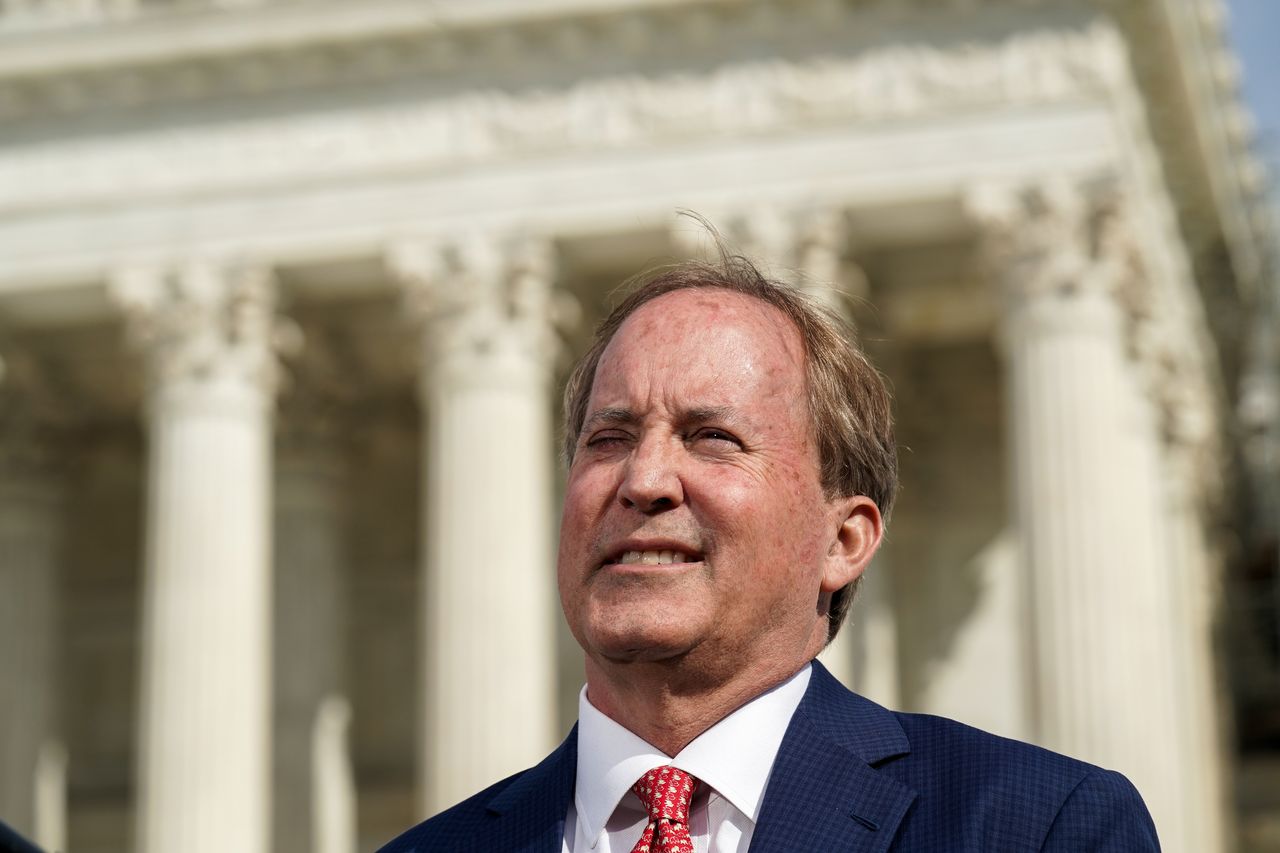| |  | | | | |  | By Megan R. Wilson | - New Tylenol suit: Texas Attorney General Ken Paxton sued Tylenol-maker Kenvue, claiming it misled pregnant women about autism risks, a move aligning with Trump’s call to avoid acetaminophen despite opposition from top medical groups.
- Medical debt: In new guidance, the Trump administration says federal credit reporting law preempts state bans on including medical debt in credit reports.
- AI vs. humans: A new poll finds few adults use health apps to manage chronic conditions, but a JAMA study shows use could be beneficial, focusing on how an AI diabetes coach performs as well as humans.
Good afternoon and welcome to Health Brief. The Washington Post’s Capital Weather Gang notes that Washington is in for a colder-than-normal week, continuing an October trend. So while there’s a chill in the air, health policy is heating up: The Senate’s health panel is having two hearings this week — one on biotech competitiveness, and the other to consider the administration’s pick for surgeon general — and the Senate Finance Committee is holding a confirmation hearing for the nominee for HHS’s inspector general. Plus, there’s a flurry of activity expected from the administration. What are you hearing? Send all your best health policy intel, tips and scoops to megan.wilson@washpost.com or message me on Signal at megan.434. This newsletter is published by WP Intelligence, The Washington Post’s subscription service for professionals that provides business, policy and thought leaders with actionable insights. WP Intelligence operates independently from the Washington Post newsroom. Learn more about WP Intelligence. |  | | Texas Attorney General Ken Paxton sued Kenvue, which makes Tylenol, and its former parent company, Johnson & Johnson. (Jahi Chikwendiu/The Washington Post) | | | |  | The Lead Brief | Texas Attorney General Ken Paxton — has sued the company that makes Tylenol, arguing it “deceptively” advertised its products to pregnant women despite knowledge of a link to autism in children. It builds off of recent actions from top federal health agencies to warn that acetaminophen, the active ingredient in Tylenol, should be avoided during pregnancy — including updating the drug’s safety label. Last month, President Donald Trump repeatedly told women who are pregnant not to take it, urging them instead to “tough it out.” “Don’t take Tylenol!” Trump said during a briefing at the White House. “There’s no downside. Don’t take it! You’ll be uncomfortable. It won’t be as easy, maybe. But don’t take it!” The recommendations are counter to recommendations by major medical organizations, including the American College of Obstetricians and Gynecologists, which still recommend acetaminophen as one of the few safe options for pregnant women in terms of pain relief and fever reduction. The company, Kenvue, is pushing back on what it says are “baseless” claims in the Texas lawsuit. In a statement, Kenvue also said that it’s “deeply concerned by the perpetuation of misinformation on the safety of acetaminophen and the potential impact that could have on the health of American women and children.” → Read Daniel Gilbert in the Washington Post newsroom, who has the full report on all the details of the suit. Paxton — who is running for Senate in hopes of unseating Republican Sen. John Cornyn — has filed the lawsuit in state court, invoking the Make America Healthy Again movement. The companies “betrayed America by profiting off of pain and pushing pills regardless of the risks,” Paxton said in a statement. “By holding Big Pharma accountable for poisoning our people, we will help Make America Healthy Again.” Calley Means, an ally of Health and Human Services Secretary Robert F. Kennedy Jr. and brother of Trump’s nominee for surgeon general, Casey Means, thanked Paxton for bringing the suit against Kenvue and former parent company, Johnson & Johnson. “There is a new sheriff in town for big pharma,” Calley Means said. → The company is also in the midst of a similar legal fight with plaintiffs alleging that Kenvue didn’t properly warn them about the potential for Tylenol to cause autism and other disorders, including ADHD, in children. What’s next: The litigation — which combined roughly 600 cases from around the country — was thrown out by a federal judge in New York, who deemed the plaintiffs’ expert witnesses as unreliable. The case is being appealed, and oral arguments are set for Nov. 17. | | | |  | Executive Health Brief | Fifteen states have laws that prohibit medical debt from being included on credit reports — a move that the Trump administration claims in new guidance isn’t permissible. Federal law — namely, the Fair Credit Reporting Act — overrides any state actions, wrote Russell Vought, the White House’s budget chief who’s also serving as acting head of the Consumer Financial Protection Bureau. He has said he wants to wind down the agency, which Congress created as part of sweeping financial reforms in 2010. Why it matters: The Trump administration’s new guidance isn’t legally binding and courts haven’t weighed in on the federal preemption of the state bans — so the move could reignite a fight over how health bills affect millions of Americans’ credit. It also comes as Congress debates whether and how to extend enhanced premium tax credits that help people afford to buy health insurance. → Lenders use a person’s credit report to determine creditworthiness when making large purchases, renting an apartment or obtaining a credit card, making them incredibly important. CFPB issued a report in 2022 that found medical debt doesn’t predict a person’s creditworthiness. Not long after, major credit-reporting bureaus announced that medical debts under $500 wouldn’t be included on these reports. Vought, in the new regulatory filing, argues that having a patchwork of state laws hurts both borrowers and lenders. “If some State laws were to limit the types of adverse information that could be included in a credit report, lenders may not be able to accurately identify the riskiest borrowers, which in turn could lead to a cross-subsidy by good credit risk borrowers for worse credit risk borrowers,” he writes in the guidance. In another example, he says, “if regulation of credit reports is fragmented by State, lenders may charge more for credit in the States where regulation diverges from the national standard in order to account for the reduced accuracy of credit reports in those States.” Earlier this year, a federal court struck down a Biden-era rule from the CFPB that would have kept large amounts of medical debt from being included as part of a person’s credit score, arguing the agency overstepped its authority. Federal courts haven’t ruled on the preemption issue, however, leaving that open to interpretation. → When finalizing the rule in January, before Trump took office, the CFPB had said it would impact approximately 15 million Americans and ultimately delete $49 billion in medical bills from the credit reports. Other CFPB data released in 2023 show that nearly 4 million Americans aged 65 or over — almost all of whom had insurance coverage — had unpaid medical bills totaling $53.8 billion in 2020. Older Americans had a median of $1,500 in unpaid medical bills, though the average amount of medical debt totaled $13,800. | | | |  | Tech Check Up | Top Trump administration health officials want health tracking technology to revolutionize care, particularly for people with chronic conditions including obesity and diabetes, but a new KFF poll shows that there’s still a way to go until use becomes more ubiquitous. Fewer than a quarter of adults have used a website or app to help manage a chronic condition with their doctor, according to the poll. An important caveat: The poll didn’t track the use of general personal fitness or wellness apps. Most people are using health care apps to access medical records or test results, schedule doctors’ appointments and manage their medications. About half use them to message their providers. → There are emerging studies showing that there could be a place for artificial intelligence in chronic disease management. A new study of adults with prediabetes published in JAMA on Monday found that an AI assistant wasn’t inferior to actual human coaches when managing their weight, A1c levels and physical activity. Participants in a diabetes prevention program were given access to a mobile app and Bluetooth-enabled digital scale or a human coach. → An interesting note: The AI-led diabetes prevention program was less useful than the human-led program, but people engaged with it more often. Overall, the results — in terms of physical activity, weight loss and A1c levels — were roughly equal. Although AI coaches didn’t do a better job in helping people with prediabetes, the authors write, the “value [of using AI] lies in scalability rather than superiority” — in other words, it could be used to reach more patients than human coaches. The biggest challenge: Trust. The KFF polling shows that Americans have privacy concerns about health care apps, regardless of who makes it — 75 percent to 78 percent of respondents said they’d be “very” or “somewhat” concerned about the privacy of their information with a government-managed or tech company-managed health app, respectively. There’s also a lack of trust among most people of health insurance companies or providers managing them. | | | |  | What We’re Reading | “Food giants take on Kennedy-backed state laws,” reports Maya Goldman at Axios. “Trump administration delays release of new dietary guidelines amid shutdown,” CNN’s Adam Cancryn and Sarah Owermohle report. “UnitedHealth maps path back to Wall Street’s good graces,” writes Rebecca Pifer at Healthcare Dive. "Virologist known for criticizing mRNA vaccines fired from HHS," reports Carolyn Y. Johnson at The Washington Post. “HHS Employees Now Being Measured By Loyalty To Trump’s Policies,” according to Jennifer Bendery at HuffPo. “Chinese biotech industry shows no signs of slowing as threat of U.S. restrictions loom,” Brian Yang writes at Stat. “Diphtheria, a Once Vanquished Killer of Children, Is Resurgent,” according to Stephanie Nolen at the New York Times, reporting from Somalia. | | | | | | | ©2025 WP Intelligence, a division of The Washington Post | Privacy Policy |
| | | |